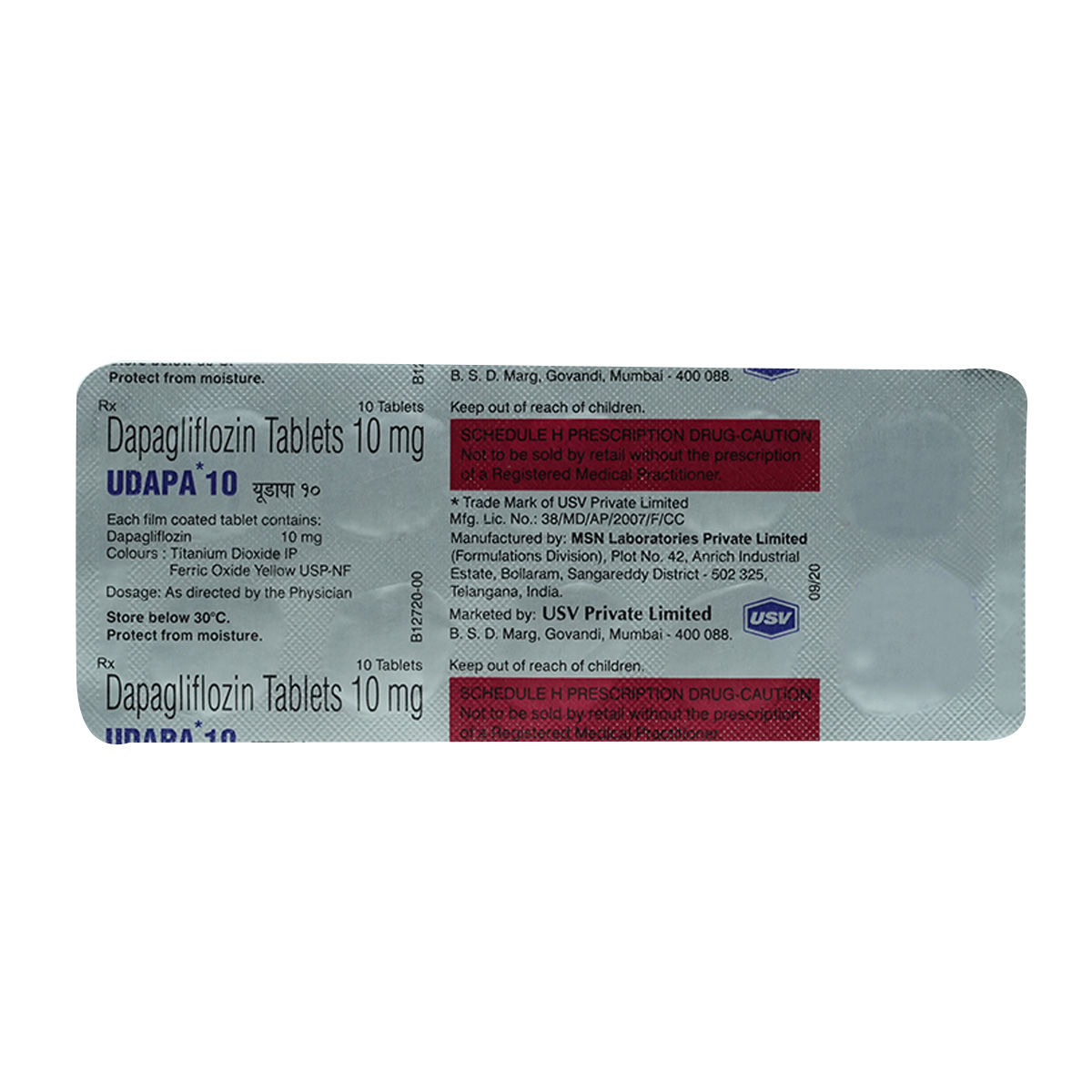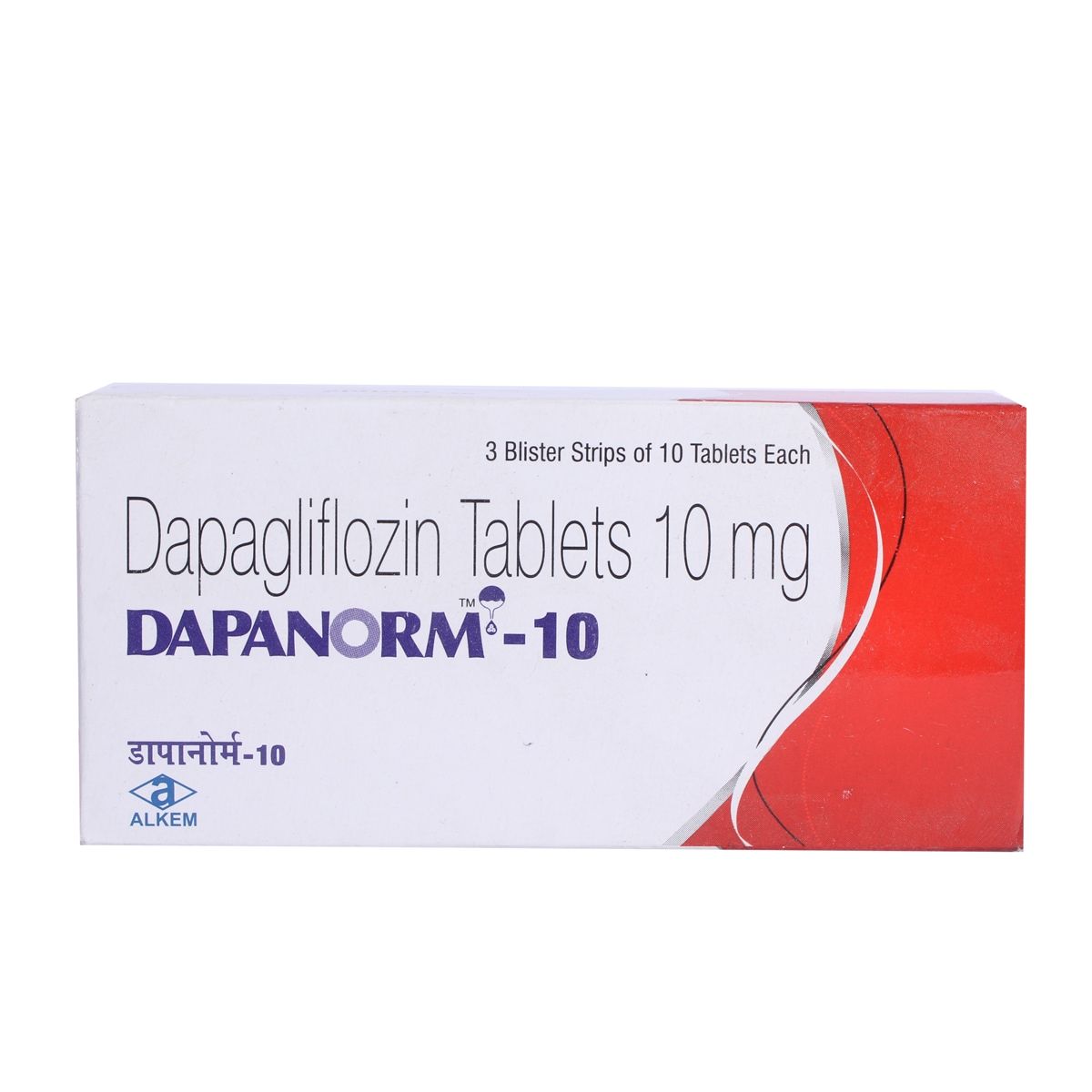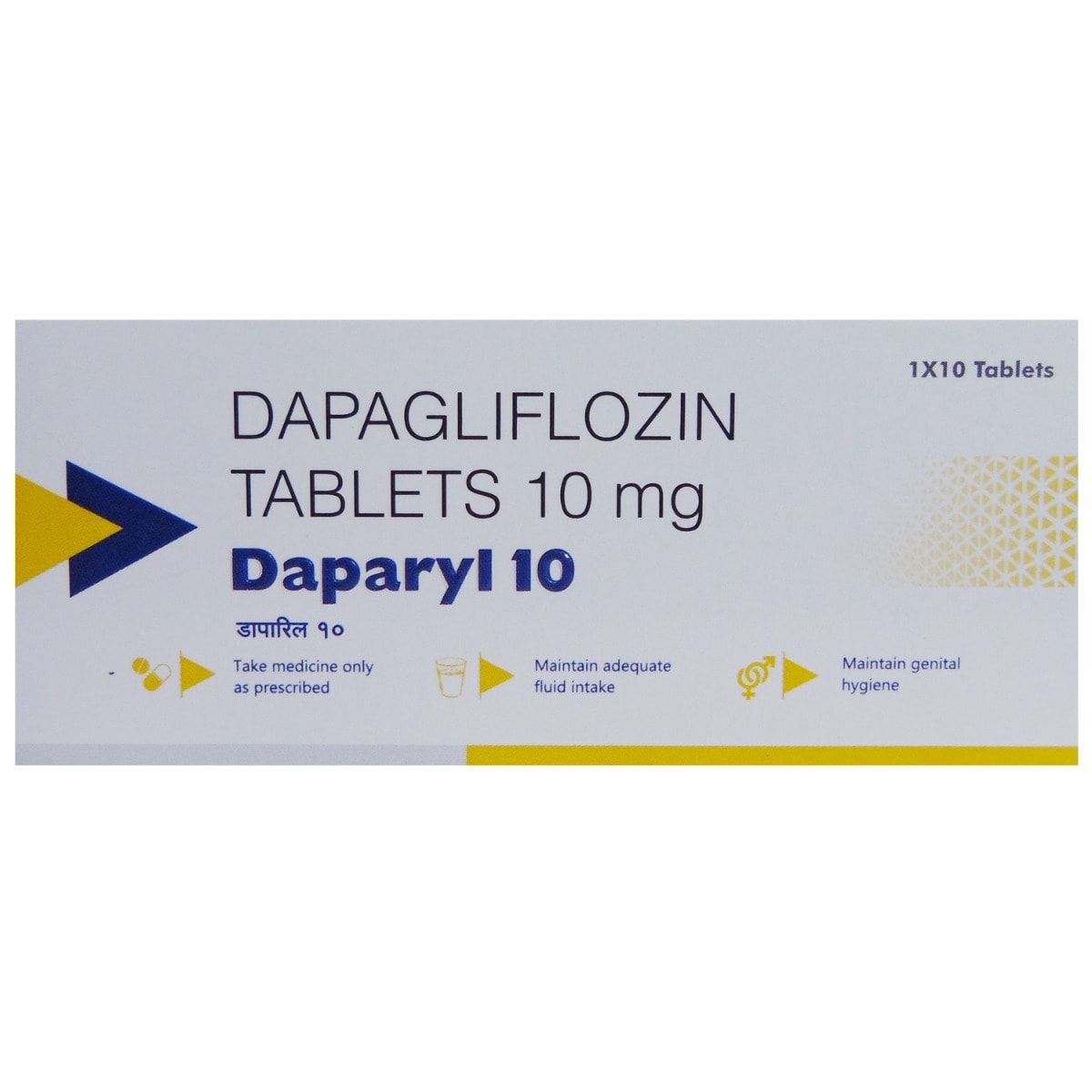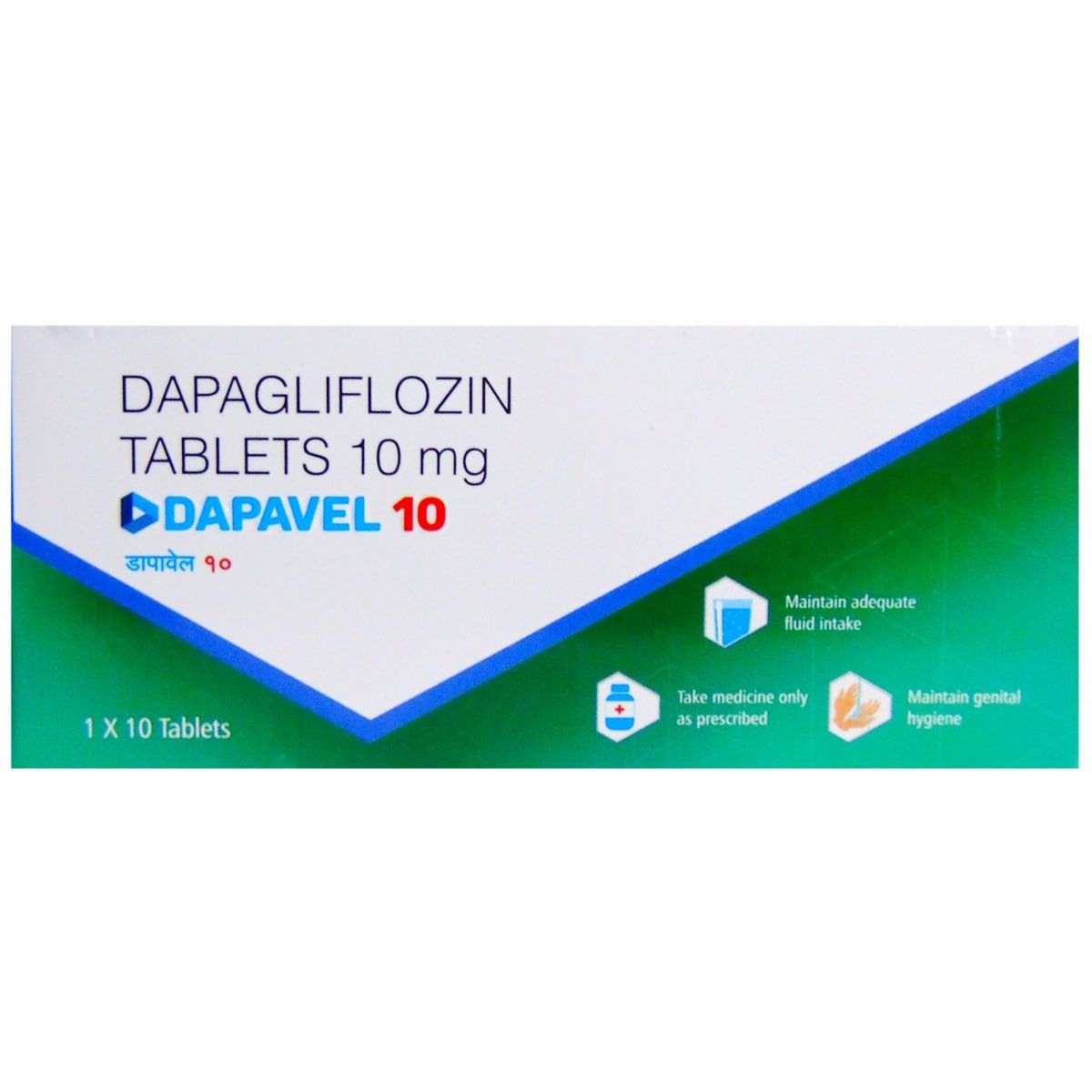Dapacid-10 Tablet 10's
Dapacid-10 Tablet is used for the management and treatment of type 2 diabetes. It contains Dapagliflozin, which works by inhibiting the reabsorption of glucose in the body, resulting in an increase in glucose excretion through urine. The removal of excessive glucose helps to lower down the blood sugar level. In some cases, you may experience side effects such as urinary tract infection, low blood sugar levels (hypoglycemia), peeing more than normal, skin rash, dizziness, increased thirst, or nausea. Before taking this medicine, you should tell your doctor if you are allergic to any of its components or if you are pregnant/breastfeeding, and about all the medications you are taking and pre-existing medical conditions.
₹90*
MRP ₹100
10% off
₹85*
MRP ₹100
15% CB
₹15 cashback(15%)
Free Delivery
With Circle membership
(Inclusive of all Taxes)
This offer price is valid on orders above ₹800. Apply coupon PHARMA10/PHARMA18 (excluding restricted items)
Know Your Delivery Time
Provide Delivery Location

Whats That

Secure Payment

India's Most Trusted Pharmacy

Genuine Products
Composition :
Manufacturer/Marketer :
Consume Type :
Return Policy :
Expires on or after :
About Dapacid-10 Tablet
Dapacid-10 Tablet belongs to the category of medicines called 'anti-diabetic' primarily used for the management and treatment of type 2 diabetes. Type 2 diabetes is a condition that occurs when there is either less insulin or available insulin is not properly utilized by our body cells for lowering raised blood glucose. It is the most common type of diabetes, accounting for around 90% of total diabetes cases found commonly in middle-aged people. So it is also called adult-onset diabetes or non-insulin-dependent diabetes mellitus (NIDDM).
Dapacid-10 Tablet contains 'Dapagliflozin' a protein found in kidney known as sodium-glucose cotransporters-2 (SGLT-2 inhibitor) that works by inhibiting the reabsorption of glucose in the body, resulting in an increase in glucose excretion through urine. The removal of excessive glucose helps to lower down the blood sugar level.
Take Dapacid-10 Tablet as prescribed. Your doctor will recommend you how often you take Dapacid-10 Tablet based on your medical condition. In some cases, you may experience urinary tract infection, low blood sugar levels (hypoglycemia), peeing more than normal, skin rash, dizziness, increased thirst, Nausea. Most of these side effects of Dapacid-10 Tablet do not require medical attention and gradually resolve over time. However, if the side effects are persistent, reach out to your doctor.
If you are hypersensitive to any of the components present in these medicines, please tell your doctor before taking it. Dapacid-10 Tablet is not allowed to use in children below 18 years of age. If you are a woman who is pregnant or breastfeeding or planning to be pregnant, then tell your doctor before they prescribe this medicine to you. Dapacid-10 Tablet , when used with diuretics, may increase the risk of dehydration, kidney problems and lower blood pressure. Let your doctor know if you are taking any other medication. Do not take or stop Dapacid-10 Tablet if the doctor did not advise you to do so. Limit your alcohol consumption with Dapacid-10 Tablet as alcohol may cause a rapid increase or decrease in blood sugar levels.
Uses of Dapacid-10 Tablet
Medicinal Benefits
Dapacid-10 Tablet belongs to the anti-diabetic drug category, indicated in the treatment of type 2 diabetes or non-insulin-dependent diabetes (NIDDM). This medicine is primarily prescribed to persons whose blood sugar levels are high and not controlled by diet and exercise alone. Dapacid-10 Tablet consists of “Dapagliflozin” a sodium-glucose cotransporter-2 (SGLT-2) inhibitor responsible for inhibiting SGLT-2 enzymes in the kidney. Thus, it prevents the reabsorption of glucose from the blood filtered through your kidney, thereby increasing the glucose excretion from your body when you urinate.
Side Effects of Dapacid-10 Tablet
- Urinary tract infection
- Low blood sugar levels (hypoglycemia)
- Frequent urination
- Skin rash
- Dizziness
- Increased thirst
- Nausea
Directions for Use
Storage
Drug Warnings
Tell your doctor if you are allergic to Dapacid-10 Tablet and other medicines, have severe kidney disease, high ketone levels in blood or urine, heart disease, congestive heart failure, liver disease or you are using insulin or other oral diabetes medications. Dapacid-10 Tablet , when used with other diabetes medications, may extremely lower the blood sugar level leading to hypoglycemia condition, which can be fatal. Your doctor may adjust the dose by lowering the dose of other diabetes medicine or Dapacid-10 Tablet in this case. A person should keep taking Dapacid-10 Tablet even if they are feeling that their blood sugar levels are under control as it may again spike the level of sugar in the blood. You should take small frequent meals and don't fast while being treated with Dapacid-10 Tablet . Try to notice if you are developing the symptoms of hypoglycemia (low blood sugar) like sweating, dizziness, dry mouth, dry skin, palpitations, shivering, intense thirst, frequent urination. If you notice any of the mentioned symptoms, then immediately take honey/sugar candies and consult with a physician.
Therapeutic Class
Drug-Drug Interactions
Drug-Food Interactions
Diet & Lifestyle Advise
Fill your half plate with starchy veggies, a quarter with proteins and a quarter with whole grain.
Eat at regular intervals. Do not take a long gap between a meal or snack.
Monitor your blood sugar level regularly, especially when there are lots of fluctuations.
Invest at least 150 min of moderate-intensity physical activity or one hour and 15 minutes of high-intensity exercise every week.
Lose weight gradually to achieve a healthy body mass index (18.5 to 24.9).
Replace refined carbohydrates containing whole-grain foods and increase the intake of fruits and veggies and other fiber-enriched foods.
Reduce intake of saturated fat (or hidden fats) in food like chips, crisps, pastries, biscuits and samosas. Choose omega 3 fatty acid-containing oils for daily cooking. You can use palm oil, mustard oil, groundnut oil, rice bran oil and safflower oil for frying.
Do not take stress as it may elevate your blood sugar level. You can adopt stress management techniques like mindfulness to control stress-related blood sugar changes.
Opt for low-fat dairy products (low-fat yogurt, fat-free milk, and cheese, etc.).
Keep your blood pressure as normal (120/80) as possible as it reduces the risk of cardiovascular diseases in diabetes patients.
Habit Forming
How Dapacid-10 Tablet Works
What if I have taken an overdose of Dapacid-10 Tablet
Alcohol
Caution
You should avoid consuming alcohol with Dapacid-10 Tablet as it may lead to high or low blood sugar levels.
Pregnancy
Caution
Dapacid-10 Tablet is a Category C pregnancy drug that is not recommended for pregnant women or given only under strict guidance of the doctor as there is no clinical data available on use in pregnant women.
Breast Feeding
Caution
There is no sufficient data on how Dapacid-10 Tablet affects breastfeeding. It is safe to seek medical advice before you start Dapacid-10 Tablet if you are lactating.
Driving
Caution
Drive only if you are physically stable and mentally focused, if you experience drowsiness after taking these medications, you should not drive or operate any machinery or vehicles.
Liver
Caution
Take Dapacid-10 Tablet only after the doctor's prescription, especially if you are dealing with Liver diseases/conditions as your doctor may adjust the dose as required.
Kidney
Caution
Take Dapacid-10 Tablet after the recommendation of a doctor, especially if you have a history of Kidney diseases/conditions. The dosing strength needs to be adjusted by your doctor as required.
Children
Unsafe
The use of Dapacid-10 Tablet is not recommended for children below 18 years.
Country of origin
Manufacturer/Marketer address
Author Details
We provide you with authentic, trustworthy and relevant information
FAQs
Disclaimer
Product Substitutes























